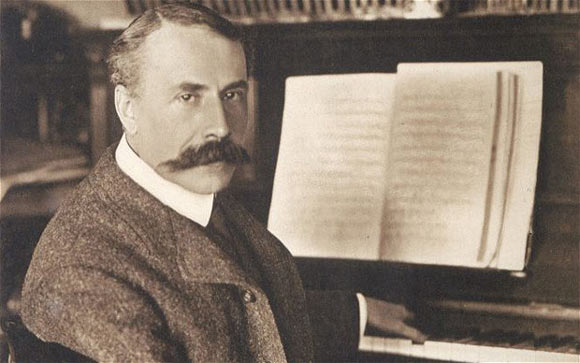
Sir Edward William Elgar was an English Violinist and Composer. His musical prowess helped him succeed Sir Walter Parratt as Master of the King’s Music in 1924.
Edward Elgar was born in a small village just outside of Worcester, England on June 2, 1857. His father, William Elgar, was an esteemed violinist; he was also an organist at St. George’s Roman Catholic Church. Hence, the young Elgar received plenty of instruction in music during his early years. At the age of fifteen, Elgar received lessons in violin from the Hungarian Musician Adolf Pollitzer. He wanted to continue his musical studies at the Leipzig Conservatory in Germany; however, his father could not afford to send him. Thus, Elgar spent his time playing and teaching the violin at his father’s music shop. He slowly made his way into Worcester’s leading music circles, as his emphatic performances at the Birmingham Festivals were understandably hard to miss. Elgar continued working for the Birmingham Festivals, and soon he started writing music for them. In 1892, he wrote “The Black Knight” and in 1896, he wrote “King Olaf”. His 1897 work, “Three Bavarian Dances”, helped him earn a spot at the Three Choirs Festival.
Elgar’s first magnificent success came in 1899 when he wrote “The Enigma Variations”. The fourteen variation orchestra, first conducted by the famous German Conductor Hans Richter, attracted unbelievable audiences at London Theatres. The work helped Elgar achieve widespread fame and nobility. Soon, the variations were premiered all over Europe, and Elgar’s name was mentioned in parallel to English Music. In 1900, Elgar wrote the music for Cardinal John Henry’s Poem “The Dream of Gerontius”, which, like the Enigma Variations, found its way into Europe. By 1902, his work travelled beyond Europe to reach the theatres of New York. Elgar then wrote the “Pomp and Circumstance Marches”, which was first performed in 1901 at a London Promenade Concert. Henry J. Wood, the conductor of the performance noted that it was “the one and only time in the history of the Promenade Concerts that an orchestral item was accorded a double encore”. The work was also revised in the future to accommodate lyrics, it became so popular that it was considered an unofficial national anthem in Britain, and it would be used as a theme for all high school graduations in the United States.
He was knighted by King Edward VII at Buckingham Palace in 1904. From 1905 to 1908, he held the position of Peyton Professor of Music at the University of Birmingham. At 1905 he wrote “Introduction and Allegro for Strings”, and in 1906 he wrote an oratorio titled “The Kingdom”. In 1908, Elgar wrote his First Symphony. The symphony reintroduced Elgar to intercontinental fame. He soon followed his First Symphony with a Violin Concerto in 1910, which was equally well received. In June 1911, Elgar was appointed to England’s highly prestigious Order of Merit. He then wrote a choral ode titled “The Music Makers” in 1912 and a symphonic study titled “Falstaff” in 1913. At the outbreak of World War I, Elgar wrote several patriotic songs. His song “Land of Hope and Glory” was his most famous war-time composition.
Edward Elgar died on February 23, 1934 due to complications from colorectal cancer. He is remembered in English history as one of the greatest English domposers to have ever lived. Many of his works are featured in the international classical music repertoire.